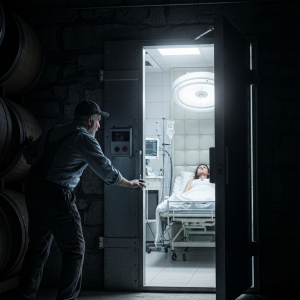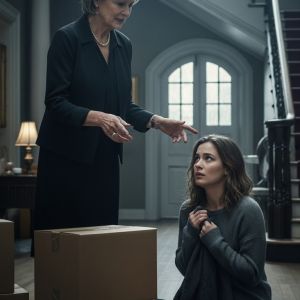The air in the auditorium, thick with the scent of starched uniforms and polished leather, grew heavy as General Martinez’s words echoed from the podium. I could feel hundreds of gazes piercing me like daggers, none sharper than those of my own father and mother seated in the front row. Their faces, moments ago flush with parental pride for my younger brother, had gone chalky white, as if they had seen a ghost. Not just any ghost, but the ghost of a betrayal they themselves had meticulously crafted and nurtured for nearly a decade.
I am Michael, 34 years old. And for the past eight years, in the echo chambers of family gatherings and quiet neighborhood gossip, my family has told everyone who would listen that I abandoned the United States Navy out of cowardice. My father, Edward, a former lieutenant whose own military career had ended short of the glory he so desperately longed for, had made my supposed desertion his favorite cautionary tale, a dark legend to enhance his own tragic narrative. “Michael couldn’t even stand three months of basic training,” he would repeat, his voice a theatrical blend of sorrow and disappointment as he served whiskey to his friends. “Thank God we have Alexander. He has what it takes.” My mother, Carol, would just nod, her expression a painful mixture of shame and resignation, as if my very existence had irrevocably stained the family name.
The reality was a life I could never share, a secret locked away behind layers of confidentiality protocols and sworn oaths. Eight years ago, I wasn’t a deserter; I was a recruit. I was handpicked for a special operations unit so classified that its very existence was a state secret. While my family believed I was working a dead-end job at a small security company in the capital, I had been leading clandestine operations in more than fifteen countries. I had seen the best and worst of humanity, rising through the ranks to become a Colonel in record time, a feat achieved in the shadows, unknown and uncelebrated by those I called family.
Every holiday, every birthday, was an exercise in agonizing restraint. I would attend these gatherings in civilian clothes, a ghost at their feast, listening to their thinly veiled insults. “At least you found something you can handle,” my father would say, patting my shoulder with a condescending pity that felt like a physical blow, before launching into a grand monologue about Alexander’s most basic achievements in his training. “Your brother will soon be a Special Forces Marine. Do you know what that means?” Of course, I knew. I had trained several of them. But I would just nod, a silent prisoner of my own duty.
When Alexander invited me to his graduation and decoration ceremony, I agreed to attend. My younger brother wasn’t to blame for our parents’ lies. He genuinely believed I had deserted because that’s the story they had woven into the fabric of his adolescence. “I know this might be difficult for you,” he wrote to me in a heartfelt email, “but it would mean a lot if you were there.”
So I went. I chose a seat in the farthest back row, a solitary figure in a sea of proud families, wearing civilian clothes instead of the dress uniform that was rightfully mine. What no one in my family knew, what they couldn’t possibly imagine, was that General Hector Martinez, the man who would preside over the ceremony, had been my direct superior for three grueling years in operations that would forever remain in the shadows of official history.
I watched him step up to the podium, his bearing as stern and commanding as I remembered from a dozen dusty, dangerous mission briefings. He spoke of honor, loyalty, and sacrifice—values that had become both my shield and my cage, forcing me to endure years of family humiliation in silence. I saw Alexander receive his insignia, his face beaming with a pure, uncomplicated pride. I saw my parents in the front row, applauding with tears of genuine joy streaming down their faces. I applauded too, discreetly, a wave of sincere happiness for my brother warring with the bitter irony of my own situation.
That’s when it happened. After the main ceremony, after the last of the graduates had been honored, General Martinez paused. He didn’t move to conclude the ceremony. Instead, he scanned the auditorium, his gaze sweeping over the rows of faces until his eyes, sharp and discerning, locked onto mine. I saw immediate recognition, followed by a flicker of something that looked like righteous indignation.
“Before concluding,” he said into the microphone, his voice resonating with an authority that instantly silenced the room’s cheerful chatter, “I must recognize someone whose presence here today is as unexpected as it is honorable.”
A murmur of confusion ran through the crowd.
“Colonel Michael,” he declared, his voice booming through the auditorium’s sound system, each syllable a sonic boom shattering eight years of silence. “Could you please stand up?”
For a second that stretched into an eternity, nobody moved. The world slowed down, the air growing thick and heavy. My eyes met Martinez’s across the vast expanse of the hall. He didn’t blink. The same man who had ordered me on impossible missions in sun-scorched deserts and disease-ridden jungles now demanded my presence before hundreds of civilians and ranking officers. I swallowed hard against the lump in my throat and stood up. The sound of my chair scraping against the polished floor was, for a moment, the loudest noise in the universe.
Every head in the room swiveled in my direction. I saw Alexander, his eyes wide, his mouth agape, as if he’d been struck. And my parents… my God. My father, Edward, was frozen, his face flushed a deep, mottled red, a terrifying mixture of shock, fury, and dawning shame. My mother, Carol, brought a trembling hand to her mouth as if to stifle a scream.
I walked down the center aisle, feeling like a defendant heading to his own trial. Each step echoed with the weight of their eight-year-long lie. The failure. The coward. The family shame. But as I walked, something shifted. In that moment, I was none of those things. I was Colonel Michael, an officer of the Advanced Intelligence Special Operations Forces, a unit so secret it didn’t even appear in public records.
Martinez waited for me on stage. When I reached him, he shook my hand firmly, his grip like iron. “This man has saved lives in at least fifteen countries,” he announced to the silent, watching crowd, his voice thick with an emotion he rarely showed. “He led operations that changed the course of conflicts. And yet, he has silently endured the shame imposed by a lie. Today, as a general and as a man, I break protocol out of a duty to justice.”
He turned and hugged me, a real, heartfelt embrace, not a symbolic gesture. The applause started, a hesitant ripple from a few officers who knew the name, which then grew into a thunderous standing ovation. The entire auditorium was on its feet. Except for my parents.
Alexander was the first of my family to rise. He ran to me, his new insignia glinting on his uniform, and hugged me with a confused, urgent tightness. “Why?” he whispered, his voice choked with a dozen conflicting emotions. “Why didn’t you ever tell us?”
“Because I couldn’t,” I replied, my hand on the back of his neck, a familiar, brotherly gesture from our childhood. “And because no one was willing to believe me when it mattered most.”
As I left the auditorium, my phone vibrated. It was my wife, Isabella, who had been watching the ceremony via a private military broadcast. Her message was simple: Now they know. Come home when you’re ready. I’m waiting for you. But I knew the real confrontation was yet to come.
Hours later, I accepted Alexander’s invitation for a family dinner. “They want to talk,” he’d said, his voice full of a naive hope that broke my heart. The restaurant was elegant, our table tucked away in a discreet, private corner. The silence was a crushing, physical weight. My father sat with his arms crossed, a thunderous expression on his face. My mother stared at her menu as if it held the secrets to the universe. My Aunt Rose, the family’s steadfast voice of reason, was also there, a buffer Alexander had wisely invited.
The cold war began as soon as the waiter left our table. “Eight years, Michael,” my mother began, her voice tense and brittle. “You left us for eight years without a word, and now you appear in an auditorium with a general calling you ‘colonel’.”
“I never left you,” I said, my voice calm, measured. “I was always here. But my mission, my oath, required silence.”
My father let out a bitter, derisive laugh. “Duty? Abandoning your own family is duty now?”
“No, Dad,” I replied, the control on my temper starting to fray. “But fulfilling an oath is. I signed confidentiality protocols that were legally and morally binding. My life, and the lives of my men, depended on my silence. When I disappeared from the radar, you didn’t look for answers. You invented a story, a narrative that suited you, because it was easier for your pride.”
He slammed his fist on the table, making the silverware tremble. “And what did you want me to say? Huh? That my son vanished and I didn’t know if he was alive or dead? I’m a former lieutenant, Michael! I have a reputation!”
“You have pride,” I shot back, my own voice rising with the force of eight years of suppressed rage. “But you never had the courage to defend your own son. It was easier to call me a coward than to admit you didn’t know something. You cared more about what your friends at the VFW hall thought than about the truth of your own flesh and blood.”
That’s when Isabella arrived. Her entrance was silent, but it commanded the attention of the entire table. She was impeccable, her posture radiating an effortless authority. She kissed my cheek and sat beside me. “Good evening,” she said, her calm voice cutting through the tension.
My father glared at her, an intruder in his family drama. “And who are you, exactly?”
“Isabella Michael,” she replied, subtly flashing her wedding ring, a fact that caused my mother’s eyes to widen. “Senior Analyst, Strategic Intelligence Division. Colonel Michael’s wife, and more importantly, a witness to everything he has endured in recent years.” She let that title, that undeniable authority, sink in. “Michael served in operations whose details you will never know,” she continued, her voice cool and precise. “He endured conditions you cannot imagine. And he did it all for his country, for honor, and for you. He was never weak. He was strong enough to endure in silence when his own family, the people who should have had his back, called him a coward.”
The silence was absolute. “And now,” my father murmured, his voice choked, all the fight gone out of him, “you expect us to just believe…?”
“I’m not asking you to believe,” I said, facing him directly. “I’m telling you the truth. And if you expect me to apologize for not being the son you wanted, the son who would follow in your footsteps but never surpass you, then I’m sorry to disappoint you again.”
A year has passed since that night. The truth, when it finally comes, doesn’t heal instantly. It’s a slow, painful process of rebuilding from the rubble. My mother, in a quiet, tearful confession weeks after the confrontation, showed me a hidden photo album. It was filled with pictures Isabella had secretly sent her over the years—me at a ceremony abroad, me with my team. “I pretended I didn’t know where you were,” she whispered, her hands trembling as she traced my image on a photo. “But keeping these was my way of holding onto hope that the son I knew was still in there somewhere.”
My relationship with Alexander took a different, healthier turn. One night, sitting on my porch, he confessed, “I joined the Navy because of you, not because of Dad. A part of me always knew their story wasn’t right. I wanted to understand you.”
But the biggest change, the tectonic shift, was with my father. Months after the dinner, he came to my office at the support center for veterans I had opened. He looked smaller, older. “I tried to write this down twenty times,” he began, his voice rough with an emotion I had never heard from him before. “But no words seemed right. Michael, I’m proud of you. More than I can ever express. I spent my whole life wanting you to be like me, but you went beyond anything I ever dreamed. I’m not going to ask you to forgive me. But I want you to know I’ll be here, every day, trying to deserve it.”
I hugged my father for the first time as a man, a long, cathartic embrace loaded with a lifetime of unspoken words, now finally felt.
Today, I stood on a stage again, this time to receive my own official decoration for my service. My family was in the front row. Edward, in his old uniform, looking not at me, but up at me. Carol, her eyes moist with a pride that was pure and uncomplicated. Alexander, saluting me with a broad, genuine smile. And Isabella, my rock, my home. After the ceremony, my father hugged me again. It was strong, silent, and full of everything we had never said. Some men win wars. Others win the silence. On that day, I had finally won both.




